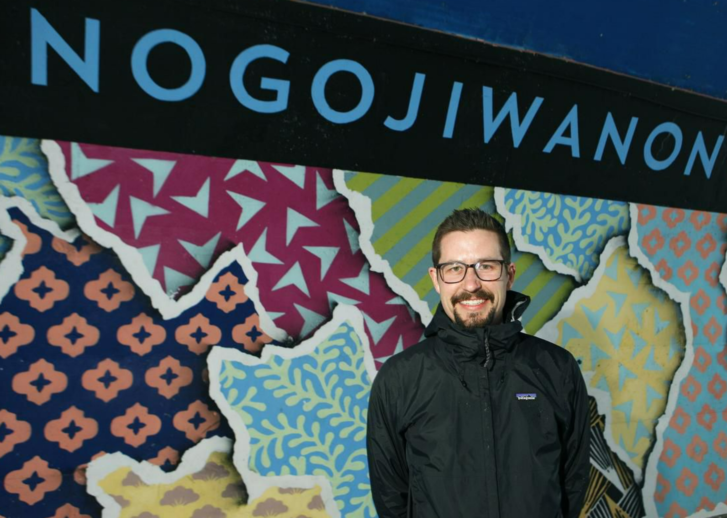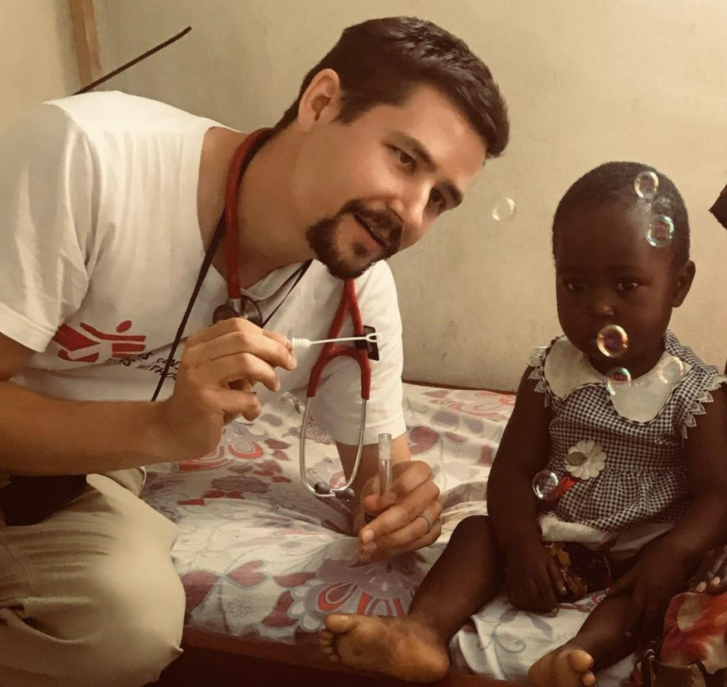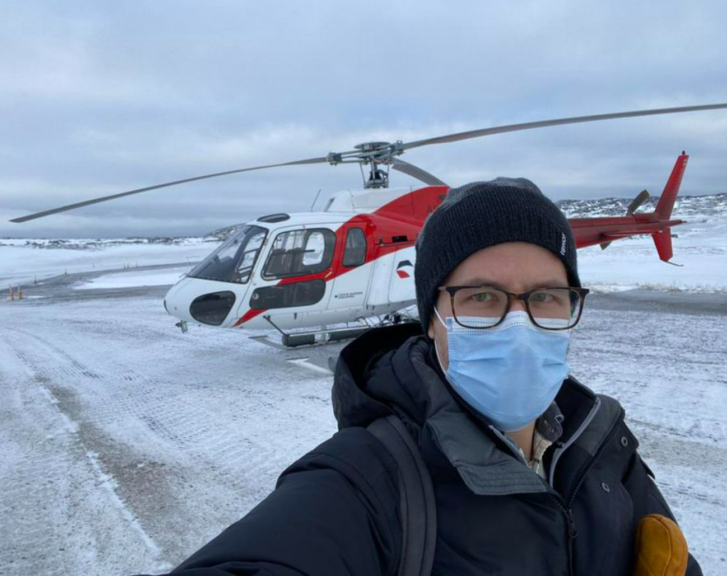Dr. Thomas Piggott has travelled the world fighting viruses. On the homefront, he is facing down a different kind of scourge.
Dr. Thomas Piggott opens his front door to a middle-aged woman holding a small food container who greets him with a friendly, “Welcome to the neighbourhood.” He’s new in town — and to his job as Peterborough’s medical officer of health. The scene being played out on his porch seems like a bit of quaint down-home hospitality on a frigid winter evening.
But it’s all an act.
Joining the woman on Piggott’s doorstep is a man filming the encounter. Seeing the camera, Piggott begins to shut the door, but the woman lunges at him, revealing the contents of her Tupperware Trojan Horse. It’s a booklet that, among other things, orders Piggott to cease propagating the “worldwide lie” of COVID-19. It’s signed on the seventh page with the woman’s fingerprint in red ink, ostensibly meant to look like blood.

Piggott’s days are long. As Peterborough’s top doctor, he is responsible for local communicable disease control at a time when one of the fastest-spreading viruses in history is plaguing the world.
By all accounts, he is doing a tremendous job. Piggott’s colleagues and community say he set himself apart with his responsiveness, transparency and patience since taking office Dec. 1.
His success is perhaps further evidenced by the sorts of people who rally against him and have grown louder and more aggressive during his tenure. A small group of COVID denialists, some of whom align themselves with sovereign citizens movements and feel unbound by laws, say he is a criminal perpetuating a global conspiracy, for which he should be hanged.
After the confrontation at his door in January, two people were arrested for criminal harassment and intimidation of a health official.
It was the second time in five days Piggott called 911 about being harassed. The weekend before, protesters put up signs at his home, one of which read, “Hands off our kids Piggott!”
“Earlier in the pandemic there weren’t really incidents that Peterborough Police were called to with regard to health-care professionals,” said police spokesperson Sandra Dueck. “Over the past several months, we have responded to a few calls at the health unit and protests outside the building.”
Piggott, who condemned these protests on social media, wound up a target, with COVID denialists showing up at his home with signs that read, “You didn’t like our protest at (Peterborough Public Health) so … here we are!”
How did it come to this? Piggott, 32, is a respected physician and public health leader who has travelled the world fighting epidemics, from treating Ebola in Uganda to working on the Public Health Agency of Canada’s H1N1 response.
He’s assisted surgeries by cellphone-light in the Democratic Republic of Congo, advocated for the indigenous San peoples while in Botswana and used snowmobiles and helicopters to carry out vaccination efforts in remote communities in Labrador.

Colleagues describe him as encyclopedic, devoted and unafraid, a brilliant science communicator who makes time for anyone with questions. The fact these qualities may have also been what incensed a small contingent of people enough to engage in a campaign of intimidation against him is devastating, those who know Piggott say.
“When you have a progressive, assertive, intelligent voice, you’re always a target for abuse,” said Peterborough Mayor Diane Therrien. “People don’t know where to direct their frustration, so they take it out on strong leaders asserting things they don’t understand or agree with.”
Therrien herself has been the target of harassment and death threats, which she said contributed to her decision not to seek re-election next year.
“But I don’t have kids,” she said. “I can’t imagine what it’s like to have young kids at home and know that you have unhinged people showing up at your residence.”
While Therrien laments the welcome Piggott has received in some quarters, she’s quick to point out the widespread support he’s garnered.
“The other members of my council are very impressed with how he conducts his media briefings and how he’s so accessible,” she said. “He’s making himself available outside of normal hours to try to educate people, which is fantastic.”
Though Piggott did family medicine training and spent time working in hospital emergency rooms, his eye was always on improving the health of whole populations through policy.
“I went into medicine with the intention of doing public health,” said Piggott in an interview with the Star. “I saw it as an opportunity to make a real difference.”
His first taste of working in macroscale health care, and what hooked him on it, was fighting H1N1 in 2009.
“That was my first big pandemic,” said Piggott, who was too young to work on SARS in 2003. He could only watch as it hospitalized family members. “I knew then the toll on communities and on our whole society pandemics can take.”
It was fast-paced work, Piggott said. The science and evidence were constantly evolving. Contributing to it, and seeing success, sparked a “passion for controlling diseases and improving health-care equity.”
A few years later, as a McMaster University medical student, Piggott travelled to Uganda for a clinical rotation during an Ebola outbreak.
“I saw people presenting with diseases that were far more advanced than they should have been,” he said. “I saw us lose kids to malnutrition and childhood infectious diseases that we’re able to do such a better job of preventing here through vaccination.”
After becoming a physician, Piggott went on assignment in Congo with Doctors Without Borders. There, he again combated an Ebola outbreak, this time working in a much more dysfunctional health-care system in a region without electricity.
“There was so much tragedy, so much life that was lost unnecessarily,” said Piggott. “There’s constantly more demand for urgent care than there is capacity to provide it. We were doing the best we could to save the lives we could. But it was tough. We lost a lot of kids.”
While there, Piggott got a masterclass on warring with infectious disease from Congolese doctors who had been on the Ebola front lines for 40 years.
Audrey Beaulieu-Forest, a nurse on assignment with Piggott in Congo, emphasized how quickly Piggott was able to absorb information, and how close he became to the local health-care team, whom he learned immensely from, as well as his patients.
“He’s so very impressive because he’s so knowledgeable,” she said. “It’s kind of like he’s an encyclopedia. And he has this way of explaining things very easily. Patients, families had a lot of trust in him. And they really, really appreciated everything he did. He offered so much support.”
Beaulieu-Forest described Piggott as a people-person, good humoured and able to connect with patients and ease their worries. The veneer never cracked at work. But in private moments, back at base, the multitude of deaths took an emotional toll.
“I didn’t have much time to wallow and reflect too much because we were working constantly and trying to do the very best that we could,” said Piggott. “But the things I saw will be with me for the rest of my life.”
The situation today is also taking a toll.
Among the over 11,770 COVID deaths in Ontario were several of Piggott’s family members, for whom they have not yet had funerals, or even time to grieve and heal.
While still in Congo, Piggott interviewed, successfully, to become medical officer of health in Labrador, where he would oversee the health of 30,000 people spread over an area as big as the United Kingdom, with communities so remote he’d need to fly in to deliver health care.
Piggott said he chose Labrador because he wanted to work in “an area of Canada that was in as high need as I had seen in my time in the Congo and internationally.”
The presence of tuberculosis is significant in both Congo and Labrador. Canada has one of the lowest rates of the disease in the world, but it is 50 times more prevalent in Labrador than the national average.
“We knew the challenges, from a public health standpoint, that we’d face in Labrador were significant,” said Piggott. “Labrador has the highest incidence of TB in the country. I did research work and supported tuberculosis work, and I wanted to do the best that I could to help.”

Priorities shifted a bit after the birth of Piggott’s second pandemic baby in late July. He and his wife wanted to be closer to family in southern Ontario, and Peterborough needed a new MOH.
There, Piggott immediately made a splash. In his first media briefing, his second day on the job, he acknowledged that COVID is airborne — something most Canadian public health officials had been reluctant to do, despite evidence.
Up until then, prevailing messaging had been that COVID spreads through aerosolized droplets, and because of that, transmission could be significantly reduced by standing six feet apart, wearing cloth masks and disinfecting surfaces.
Tackling airborne transmission is more expensive and involved. Standing six feet apart no longer matters, because air circulates all around rooms; there is no specific safe distance to keep from one another. That means air filtration must be improved, requiring heating, ventilation and air conditioning changes and using HEPA filters. It also means better masking.
Dr. David Fisman, a physician and professor of epidemiology at the University of Toronto — a longstanding proponent of COVID being airborne — told the Star he holds Piggott in high regard for his apparent willingness to reject public health dogma.
“I think he’s great,” said Fisman. “It’s odd that it takes so much courage to state the obvious, but it really does.”
Piggott said, by virtue of his public position of responsibility and authority, he has a duty to be truthful and authentic, to “treat the public like competent adults and give people information to make the best decisions they can.”
And his duty extends to his staff and colleagues in the health system, who he said are burnt out and barely hanging on. For them, Piggott must be a lightning rod.
“I will continue to stand in front of them and protect them and ensure that they feel safe and comfortable doing their work,” he said. “I’m here, this is my job, and I’m going to keep doing it.”
Article From: The Star
Author: Ben Cohen

